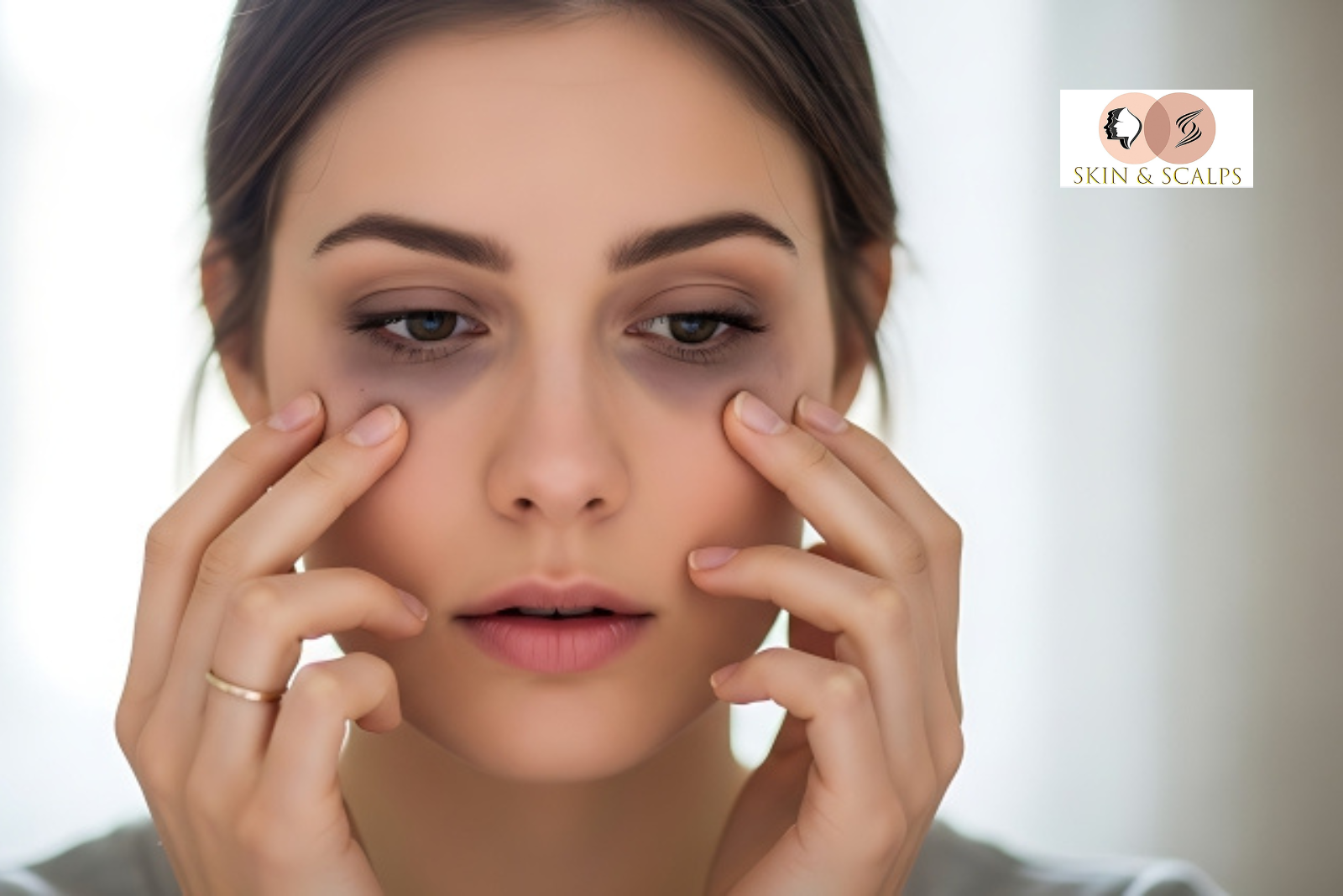One of the most common skin issues that people notice when they look in the mirror is dark circles. A young face can be instantly made to look older than it actually is by those shadows under the eyes. Dark circles are sporadic for some people and are associated with fatigue or late nights. Others have them as a constant companion, influenced by lifestyle choices, skin type, or genetics. Even though it’s not bad for your health, under-eye darkness can have a negative impact on your confidence and how other people see you. At Skin & Scalps, we think that the first step in identifying the best course of action is to understand the underlying causes, whether they are environmental, genetic, or connected to skin health.
The Role of Genetics
Dark circles are inherited by many people. You are more likely to have them if your parents or grandparents did. Blood vessel visibility under the eyes, skin thickness, and pigmentation are all influenced by genetics. Blood vessels are more noticeable in this sensitive area when the skin is naturally thin, giving it a bluish or purplish hue. The rate at which your skin ages is also influenced by your family history. Because of inherited characteristics, some people get under-eye shadows earlier. Although genes cannot be changed, there are methods in contemporary dermatology to lessen their obvious effects.
Lifestyle Habits That Make Them Worse
Dark circles are frequently accentuated by lifestyle choices. One of the main causes is inadequate sleep. The area under the eyes appears darker due to blood vessel dilatation brought on by sleep deprivation. Similar to this, stress weakens circulation and makes skin appear exhausted. Overuse of screens exacerbates the issue. Staring at electronics all the time causes eye strain and deteriorates pigmentation. Alcohol and smoking also have an impact. Both lessen the skin’s oxygen supply, making it duller and more prone to shadows. Under-eye darkness can be considerably decreased by adopting a healthier lifestyle.
Skin Health and Pigmentation Issues
Dark circles are directly impacted by the quality of the skin. One important factor is hyperpigmentation. Skin that has too much melanin under the eyes appears gray or brown. People with darker skin tones frequently experience this. Pigmentation can also be brought on by allergies. Histamines, which are released when the eyes are rubbed frequently, exacerbate inflammation and discoloration. Another underappreciated factor is dehydration. Lack of moisture causes your skin to lose plumpness, which deepens shadows. Targeted skincare and adequate hydration increase elasticity and lessen the appearance of visible circles.
Aging and Its Impact
It is impossible to overlook age as a natural factor. Your skin gradually loses its natural fat reserves and essential collagen fibers as you age. The blood vessels beneath the eyes are more visible as a result of this thinning process. A shadow-like appearance is also produced by the formation of hollow spots or tear troughs. This process is accelerated by sun exposure. UV radiation deteriorates pigmentation and breaks down collagen. By shielding your skin from UV rays, you can delay these obvious changes. Skin tone around the eyes can be improved, and lost volume restored with anti-aging treatments.
Medical Conditions That Contribute
Dark circles can occasionally be a sign of an underlying medical issue. Low iron levels cause anemia, which lowers the oxygen supply to tissues and causes darker shadows and paler skin. Discoloration and puffiness can also be symptoms of thyroid problems. Nasal congestion brought on by persistent sinus issues causes the blood vessels beneath the eyes to enlarge. For long-term skin health, it’s critical to recognize and address these medical issues. See a dermatologist for additional assessment if your circles develop suddenly or get worse in spite of lifestyle modifications.
How to Manage Dark Circles
Effective management can greatly lessen their appearance, even though total removal might not always be achievable. Your top priority should be getting a good night’s sleep. Seven to eight hours of undisturbed sleep is the goal. Drink plenty of water and consume a healthy, vitamin- and iron-rich diet. To shield the sensitive skin beneath your eyes from UV radiation, apply sunscreen every day. Vitamin C, retinol, or hyaluronic acid are a few examples of ingredients that can be found in mild under-eye creams. These enhance the brightness, hydration, and thickness of the skin. Cold compresses or slices of chilled cucumber help to improve circulation and temporarily reduce puffiness.
Advanced Treatment Options
Dermatological treatments offer efficient remedies for dark circles that are difficult to get rid of. By eliminating the outermost layer of dead skin, chemical peels lighten pigmentation. Melanin is the target of laser therapy, which also improves skin tone overall. Dermal fillers lessen the hollowness beneath the eyes and restore lost volume. Because microneedling promotes the production of collagen, the skin becomes firmer and younger-looking. Platelet-rich plasma (PRP) therapy improves the texture beneath the eyes and promotes natural healing. Our expert at Skin & Scalps creates customized regimens based on your particular skin type and issue.
Prevention is Key
It’s often easier to prevent dark circles than to treat them. Simple daily routines have a significant impact. To avoid irritation, always take off your makeup before bed. When you’re outside, wear sunglasses to protect your eyes from the sun. To lessen eye strain, cut back on screen time and take frequent breaks. Avoid rubbing your eyes too much, especially when you have allergies. Consuming foods high in antioxidants promotes healthy skin and delays the onset of aging. When regularly applied, these minor adjustments help preserve a more radiant and youthful appearance beneath the eyes.
Final Thoughts
Numerous factors, including genetics, lifestyle decisions, and skin health, can contribute to dark circles. They rarely have a medical cause, but they can have an impact on your self-esteem. The good news is that there are preventative and therapeutic options that work. At Skin & Scalps, we help you attain healthier, more radiant skin by fusing cutting-edge skincare products with medical knowledge. Keep in mind that dark circles are a sign from your body and skin that needs attention, not just a cosmetic issue. You can achieve long-lasting results tomorrow by being proactive today.

